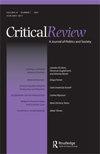物质启发和对再分配的态度
IF 1.7
3区 社会学
Q4 POLITICAL SCIENCE
引用次数: 0
摘要
根据物质启发式假设,人们的社会经济地位影响他们对社会经济环境的感知,包括社会如何分配机会和奖励,以及人们在多大程度上对自己的经济状况负责。这些观念反过来又影响对财富再分配的态度。与物质启发式假设相反的是我们更熟悉的物质自利假设,它将再分配态度与从再分配中获得或失去的个人利益联系起来;还有自私自利的推理假设,根据这种假设,对社会如何分配机会和回报的看法是对再分配态度的结果,而不是原因,而再分配态度反过来又受到物质上的自我利益的驱动。所有这三个假设都将社会经济地位和对再分配的态度联系起来,但只有物质启发式和自私自利的推理论点解释了为什么不同经济群体对财富和贫困原因的看法不同,以及为什么这种差异对再分配的态度有影响。忽视这些观念的作用可能会导致将对再分配的态度简单化地归结为个人利益。本文章由计算机程序翻译,如有差异,请以英文原文为准。
Material Heuristics and Attitudes Toward Redistribution
ABSTRACT According to the material-heuristics hypothesis, people’s socioeconomic position affects their perceptions about the socioeconomic environment, including how society distributes opportunities and rewards and to what extent people are responsible for their own economic situation. These perceptions, in turn, affect attitudes toward wealth redistribution. In contrast to the material-heuristics hypothesis are the more familiar material self-interest hypothesis, which relates redistributive attitudes to one’s personal interest in gaining or losing from redistribution; and the self-serving reasoning hypothesis, according to which perceptions of how society distributes opportunities and rewards are a consequence rather than a cause of attitudes toward redistribution, which are, in turn, driven by material self-interest. All three hypotheses connect socioeconomic position and attitudes toward redistribution, but only the material-heuristics and the self-serving reasoning arguments account for why perceptions of the causes of wealth and poverty vary across economic groups and why this variation matters for attitudes toward redistribution. Ignoring the role of such perceptions can lead to the simplistic attribution of attitudes toward redistribution to personal self-interest.
求助全文
通过发布文献求助,成功后即可免费获取论文全文。
去求助
来源期刊

Critical Review
POLITICAL SCIENCE-
CiteScore
1.30
自引率
12.50%
发文量
17
期刊介绍:
Critical Review: A Journal of Politics and Society is a political-science journal dedicated to advancing political theory with an epistemological bent. Recurrent questions discussed in our pages include: How can political actors know what they need to know to effect positive social change? What are the sources of political actors’ beliefs? Are these sources reliable? Critical Review is the only journal in which the ideational determinants of political behavior are investigated empirically as well as being assessed for their normative implications. Thus, while normative political theorists are the main contributors to Critical Review, we also publish scholarship on the realities of public opinion, the media, technocratic decision making, ideological reasoning, and other empirical phenomena.
 求助内容:
求助内容: 应助结果提醒方式:
应助结果提醒方式:


